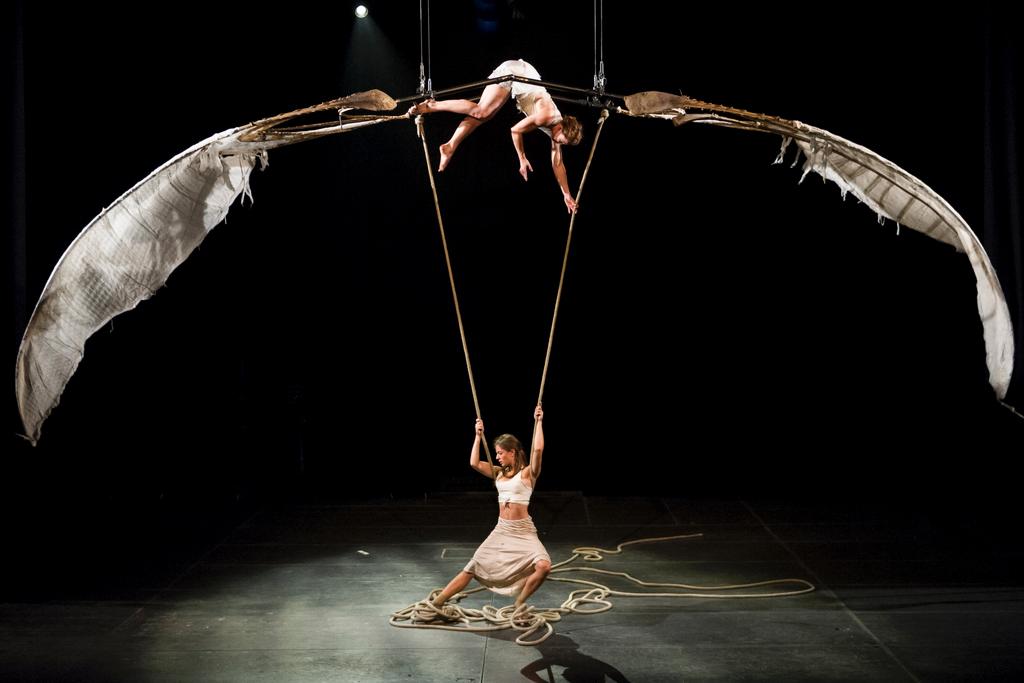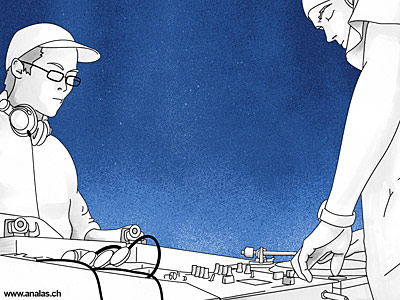Mythical opera proves a hit in Graubünden

A mythical opera in which the part of God is played by a woman has wowed crowds at the Origen Festival in the Graubünden Alps.
An original piece, ‘Mikael’ was created by a team led by Origen Festival founder Giovanni Netzer and staged in the Riom Castle in Romansh-speaking central Graubünden.
“Artistically this was a year of bold experiment: for the first time we worked with a mixed ensemble of singers, dancers and actors in our major productions. It made for wonderful, fascinating theatre,” Netzer said of the 2011 festival programme.
The some 10,500 people who visited Graubünden for the festival were treated to the sight of the gloomy medieval Riom fortress in the glow of the setting sun, its storied walls and massive tower haunted by a large colony of jackdaws. Some were lucky enough to see the castle in the eerie light of a full moon as they left.
Inside the castle, which was transformed into a long, narrow theatre, a troupe of young professional actors, dancers and singers staged ‘Mikael’ – described as a “mythical opera of light” – to enraptured audiences.
The theme of the opera is the revolt of Lucifer in heaven and his defeat by the archangel Michael, after which he is cast down into hell. The costumes are light and ethereal, the angels have no wings – and God is a young woman.
In this novel retelling of the Biblical story, Lucifer is killed in a climax of violence among the angels. God, grieving, decides to annihilate her creation and puts an end to the heavenly host.
“Our audience needs to be curious, and it must be able to deal with weighty material. Often people have an explicit interest in religious cultural history, spiritual themes and the aesthetics of liturgy – and that goes right through all social levels,” said Netzer.
Religious theatre
The Origen Festival stages original works merging the traditions of opera, oratorio, choral music, dance and drama with religious themes. Netzer’s inspiration is the Catholic liturgy and the history of sacred drama from the Middle Ages to the Baroque.
But does religious theatre really have an audience in this modern post-Christian society, or is it ‘event marketing’ that draws people to Riom Castle?
“Origen’s productions are not really suitable for event marketing,” Netzer said. “We have no big names, no well-known works, nothing that might be in the news. You will also notice that no major sponsors have anything to do with us – the programming is too complex for them.”
Netzer explains the dark and nihilistic tone of ‘Mikael’ by referring to his own history of having grown up with Bible stories and religious myth, acted as an altar-server for 20 years, and having completed a doctorate on religious theatre.
“The themes I bring onto the stage are the themes I grew up with and which fill my heart and brain. I just have to keep working on them. Of course, I don’t preach as a theologian. I create as an artist, in complete freedom,” he said.
Netzer said that the feasibility of his plays is tested on the stage in rehearsal, rather than being dogmatically cast in stone beforehand.
“That can lead to a conclusion we were not expecting as in the case of ‘Mikael’,” he said, referring to the startling finale where God annihilates the angels. “We throw out questions. We don’t provide answers.”
Local origins
The festival programme emphasises the Romansh character of Origen and Riom. Origen is produced 100% locally and is supported by all 21 communities in central Graubünden, Netzer said.
“This year we brought in fifty artists who lived in the region for three months, rehearsed and performed here, lived in the villages, encountered the local culture, studied Romansh, gave workshops, and could often be found having a coffee or beer with the locals. A fair number of the performers come from Graubünden itself,” said Netzer.
Indeed, the music for ‘Mikael’ is directed by Clau Scherrer, a well-known conductor of choirs in the Romansh Surselva region.
The Origen company have also staged ‘Cherubim’, a drama based on a sung mass by the Swiss composer Frank Martin, Gregorian choral music, and ‘Casper’, a commedia performed in the open air in various locations.
Local people are involved at all levels, with volunteers, amateur actors and tradesmen all contributing to the success of the festival, according to Netzer.
“No festival in Graubünden – not even any of the established ensembles – is as meshed with the local community as Origen is. That’s our philosophy – that’s why we’re called ‘Origen’.”
Origen started in 2005. In its first season, the festival attracted an audience of 2,100 people. Since then, audience numbers have increased fourfold.
In summer 2006, Swiss President Moritz Leuenberger inaugurated the first professional theatre venue in the history of Romansh culture at Riom Castle, an 800-year-old fortress on the Julier route.
The theatre’s infrastructure was integrated into the castle – which is protected as a national monument – to be a separate “structure-within-a-structure” and offers space for up to 220 spectators.
The name Origen (pronounced or-EE-jen) is Romansh and means genesis or origin. The festival styles itself as “a commitment to the cultural power of a trilingual region which thrives on cultural exchange”.
(Source: www.origin .ch)
Religious drama in Europe originated in the Middle Ages. It grew out of the liturgy of the Mass and was originally performed in church for the edification of the faithful.
As time went on, it moved away from the church setting and was performed on the town square, becoming more ambitious in scope. Plays typically dealt with the Last Judgement, the Passion of Christ, and the lives of the saints.
At the end of the Middle Ages morality plays like “Everyman” developed, featuring allegorical figures such as personified virtues and vices. Religious drama received a boost from the Counter-Reformation, with Baroque religious drama of the Jesuits and Calderón. It also influenced the secular theatre tradition.
Religious drama in English experienced a revival in the early twentieth century, led by T.S. Eliot and his famous play “Murder in the Cathedral”.
“Everyman” was adapted in German by Hugo von Hofmannsthal, and is frequently performed, especially at Austria’s Salzburg Festival.
The Origen productions are a renewal of religious drama, reflecting modern preoccupations. A similar effort in Switzerland is the Baroque “Theatre of the World” by Calderón in the radical modern German version by Thomas Hürlimann first put on at the monastery of Einsiedeln in 2000, which has been a critical and popular success.

In compliance with the JTI standards
More: SWI swissinfo.ch certified by the Journalism Trust Initiative












You can find an overview of ongoing debates with our journalists here . Please join us!
If you want to start a conversation about a topic raised in this article or want to report factual errors, email us at english@swissinfo.ch.